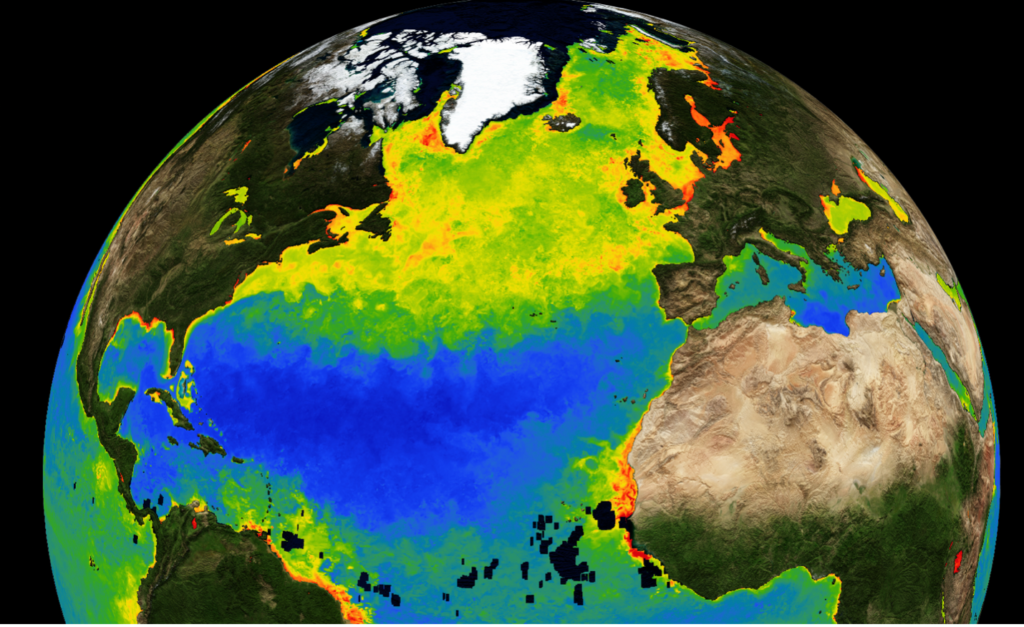Global warming is directly impacting the ocean’s net primary production (NPP) at the base of the food web as well as the seasonal timing of plankton blooms, according to a new study, published in the journal Nature Climate Change.
Contrary to the well-understood situation on land, where climate change is expected to extend the growing season of plants on average due the CO2 fertilization effect and earlier thawing of spring snow in high latitudes, the seasonal response of plankton in the ocean has remained a mystery.

To tackle this open research question a team of climate scientists from the IBS Center for Climate Physics (ICCP) at Pusan National University in South Korea, Princeton University, the University of California Los Angeles, and the Geophysical Fluid Dynamics Laboratory (GFDL), in the US, analyzed global warming supercomputer model simulations conducted with a realistic Earth system model. To better separate the human-induced effect on plankton seasonality over the next ~80 years from the naturally occurring chaotic variations, the team ran the model 30 times with increasing greenhouse gas concentrations and slightly different starting conditions.
The analysis of these so-called large ensemble simulations revealed that global warming will have a substantial influence on the timing of future plankton blooms and that these changes will become detectable against the backdrop of natural variations, reaching no-analogue conditions by the end of 21st century. Under such circumstances, there may be a mismatch in the timing of the life cycles of phytoplankton and zooplankton that feed on them, impacting the entire seasonally-paced clockwork of the marine food web. The paper indicates that such effects could be particularly severe for high-productivity regions in the high latitudes of the Northern Hemisphere.
The underlying controls on future changes in the timing of marine phytoplankton productivity derive in large part from a strong coupling of the growth and decline of ocean primary producers and zooplankton that serve as predators. Seasonal changes in ambient environmental factors such as temperature, light levels, and nutrient concentrations (so-called “bottom-up” controls) and the number of predators (top-down controls) cause phytoplankton to thrive and decline; in turn the predator populations respond rapidly to the phytoplankton abundance. The authors found that planetary warming can disrupt this delicate coupling between external environmental factors and zooplankton responses, leading to seasonal shifts in the blooming of phytoplankton. “The additional level of predator/prey interactions makes the ocean’s response more complex than the response of land plants, where the control is mostly bottom-up” says Dr. Karl J. Stein, a co-author of the study.
“Our study demonstrates the power of large ensemble computer model simulations to understand how ecosystems respond to future climate change, in this case their seasonality. Having established the timing and underlying mechanisms of future plankton bloom changes, we will address further whether such changes will have a negative impact on future food security,” says Dr. Ryohei Yamaguchi from the IBS Center for Climate Physics, and lead author of the study.
Notes for editors
– References
Trophic level decoupling drives future changes in phytoplankton bloom phenology (2022): Ryohei Yamaguchi, Keith B. Rodgers, Axel Timmermann, Karl J. Stein, Sarah Schlunegger, Daniele Bianchi, John P. Dunne, and Richard Slater, Nature Climate Change, doi: 10.1038/s41558-022-01353-1
– Media Contact
For further information or to request media assistance, please contact: U-Jeong Seo, IBS Center for Climate Physics, Pusan National University (+82-51-510-7328, u_jeongs@pusan.ac.kr)
– About the Institute for Basic Science (IBS)
IBS was founded in 2011 by the government of the Republic of Korea with the sole purpose of driving forward the development of basic science in South Korea. IBS has 34 research centers as of April 2022.
– About ICCP
The IBS Center for Climate Physics (ICCP) seeks to expand the frontiers of earth system science by conducting cutting-edge research into climate dynamics and utilizing high-performance computer simulations, with the goal of improving decadal Earth system forecasts and long-term projections. See more on http://ibsclimate.org